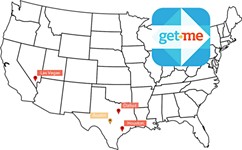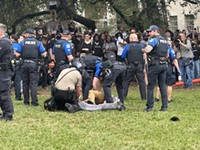Project Connect Accelerates
As decisions near, controversy dogs urban rail plan
By Mac McCann and Michael King, Fri., June 13, 2014
"The first phase of urban rail is, to a large degree, just a first phase. There is a lot more to come, and, if we do it right, we'll have that political capital to do more. We are confident that we are well-positioned to do well."
– Scott Gross, Austin Transportation Department

On Friday, June 13, the Central Corridor Advisory Group, a 16-member city advisory group on transportation, is expected to confirm its long-anticipated recommendation of an urban rail proposal, familiarly known as the initial phase of "Project Connect." The recommendation will move to the City Council, the Capital Metro board of directors, and the Lone Star Rail District board of directors. Cap Metro is expected to vote on a plan June 23, with Council likely to follow on June 26. Those votes would presumably describe an overall plan and an initial route, with financing and governance plans concurrent or following.
In practical terms, in order to confirm a November bond election to fund such a project, Council would have to approve bond language by mid-August, perhaps as early as August 7. The unofficial consensus has been that (depending on the approved details) the overall cost of the initial project would be somewhere between $1 billion and $1.4 billion – with local financing for about half that amount, the rest from Federal Transit Administration grants. (There is a certain circularity to the funding situation: The city is counting on federal funding to make the project work, and federal funding is to a degree dependent on evidence of sufficient local support.)
Yet even while official momentum builds for a November bond vote, various advocacy groups are also organizing to oppose the project, at least as currently designed. Transit advocacy groups – Austinites for Urban Rail Action and Our Rail PAC, among others – have been unhappy with the "Highland" Central Corridor plan from the beginning, and Our Rail has just announced a "coalition" with neighborhood groups along the corridor to oppose the Project Connect plan, in favor of an alignment along Guadalupe and North Lamar. And from the opposite direction, the opposition was publicly joined last week by the Coalition on Sustainable Transportation, a longstanding anti-rail group which described the project, in an email to CCAG by COST board member Jim Skaggs, as a "pre-determined rail solution which is contrary to the greater good of the community."
Meanwhile, beyond official Project Connect circles and the various task forces working on the plan, there has as yet been little public advocacy organization on behalf of the project.
Economic Reverberations
While $1.38 billion is unquestionably a big local transportation investment, the Project Connect team argues that the project will attract and concentrate economic development, likely resulting in (PowerPoint terms) "higher quality/value than dispersed growth would otherwise yield." It would reduce the local vehicle miles traveled per capita, as well as Austin's carbon footprint per capita.
Beyond that, they say, the $1.4 billion capital investment, with local construction and professional services earning $880 million, is estimated to result in $1.6 billion to $2.4 billion economic impact, and 27,000 to 33,000 direct and indirect jobs. (The team says less conservative industry models than it used peg more than $3.6 billion in economic impact.) More specifically, the planners estimate that subsequent economic development could mean an additional $31.6-44.4 million in property tax revenue, $5.9-10.8 in sales taxes, and $6.3-9.1 billion in new building value.
With any bond campaign not even begun and a bond ballot not yet defined, it's too early to tell how willing Austinites would be to help underwrite the project. The Statesman's Ben Wear has reported that a June 2013 poll conducted by Baselice & Associates for the Downtown Austin Alliance found that 43% of the surveyed Central Texas registered voters would support a property tax increase of 50 cents a day (about $180 a year) "to have more transit options" – compared to 51% in opposition.
Even assuming the voters approve a bond, FTA funding would take years to secure. At the April 11 CCAG meeting, team leader Kyle Keahey explained that the project wouldn't even be submitted to the FTA for a rating until 2017 or 2018; if that went well, then a full funding grant agreement would be expected in 2018 or 2019, before the initial rail finally opened in 2021 or 2022. For opponents, that uncertainty is a problem. In a May 16 press release, Our Rail wrote that it's unfortunate that the public "may never know how the FTA would view Project Connect's proposal before a planned bond election," because Project Connect would "not seek an FTA rating before 2017, until well after any bond election occurs."
However, the team argues that the delayed timing represents an advantage. Gross said that, after looking at the FTA's criteria, planners did a preliminary self-assessment and are working with an FTA consultant in order to make the project more FTA-competitive. The point is to get in the door with an initial rating, and once that happens, higher rated projects don't necessarily receive more funding. "A lot of the competitiveness comes from other factors," Gross says. "It comes from whether or not there's local political support for a project, whether there's technical capacity within the agency, or agencies, that are sponsoring the project. By going to bond referendum for funding earlier in the process, that greatly improves our prospects for getting funding later in the process. So we see this as a big benefit."
Gross and others associated with the project also defend the process leading to this point, calling it transparent and open, with all data made publicly available, and they insist that the team had no preconceived ideas in choosing its plan. On Facebook, Cap Metro Community Involvement Manager John-Michael Cortez described it as "perhaps the most transparent transportation planning process in the history of the City." The group has indeed held dozens of public involvement meetings and events, and both Gross and Cortez say that public input has been taken very seriously throughout.
Naysayers Say Nay
That's not what you'll hear from the loudest voices opposing Project Connect. Somewhat surprisingly, to this point the Project's most persistent opponents haven't been the predictable highway-advocacy "Road Warriors," who aren't yet very involved with the process. Instead, the loudest opposition has come from people who say they're the most avid supporters of public transit. The dissenting voices differ in the angle and intensity of their opposition, and it's not clear yet how much they reflect any broader opposition (or even knowledge) of the voting public. But the gist of their argument is that Project Connect had this alignment in mind from the beginning, didn't listen to opposing voices – and ultimately has made the wrong choice.
The objections range from the very specific (e.g., with a new bridge, what will happen to the rowers' boathouse?) to the absolute. Lonny Stern of the Alliance for Public Transportation is supportive of a bridge over Lady Bird Lake, which he would prefer over a more expensive and less adaptable tunnel that was being considered; however, he considers the proposed Hancock tunnel a poor and too expensive choice. Longtime rail advocate Lyndon Henry, who has adamantly opposed the choice of the Highland corridor, recently told KUT, "That Project Connect project is incredibly gold-plated. It's very pricey. It's the third most-expensive – per mile – urban rail project in U.S. history. Now why would a city our size want to put in something that is so pricey and a very weak route?"
Our Rail, which in the past has suggested petitioning a counter-option onto the ballot, recently declared (via Twitter), "We will OPPOSE a Project Connect ballot measure containing ANY investment that threatens the development of urban rail on Guad-North Lamar." To Our Rail Treasurer Scott Morris, "It doesn't matter what the phasing is, because the phasing is simply the menu for what will be served to the voters, and we want the real question addressed, which is: Is this train going to carry anybody?" Our Rail has also criticized the East Riverside corridor as inadequately "supported with appropriate data." (For more on the opposition, see "Dissenting Voices," p.23.)
Other groups (prominently, Austinites for Urban Rail Action) have argued for the Guadalupe/Lamar corridor, have complained about CCAG's process, and say that of the three announced Project Connect options, Option 3 (the shortest, ending at Dean Keeton) might better enable a future Guadalupe/Lamar line – but have yet to say whether they will oppose the project outright if it doesn't conform to their preferred plan.
'A First Step'
On the record at least, the planners remain undaunted. Gross understands that the plan has critics. "Certainly, we're not going to please everybody with any one project," he said. "It'd be fair to say that we would love for everybody to recognize and see the value that we have in the recommendation, but we're realistic." Both Gross and Cortez recognized the value of Guadalupe/Lamar and consider it, as Cortez posted on Facebook, "a great transit corridor, but not the best on all measures." For example, he wrote, "While the Guadalupe/Lamar corridor is incredibly congested, the Highland and East Riverside corridors are more congested."
More specifically, planners say the Guadalupe/Lamar choice was rejected in part because of Capital Metro's federally funded $38 million service upgrade that recently brought MetroRapid buses to that corridor. Henry, who rode to the interview on a MetroRapid bus, told KUT that MetroRapid "has not worked out like the predictions had expected. It's getting only about 6,000 daily trips. The whole corridor has actually declined a little bit since that route went in. In contrast, urban rail in that corridor has been predicted to carry to Downtown 37,400 trips, so about six times as many trips."
Cortez has responded that MetroRapid is still "in the middle of being implemented" and that it will take "a good year or two for a new service to mature." And Gross insists that planners are by no means ignoring the Guadalupe/Lamar corridor. "Capital Metro has invested more in Lamar and Guadalupe than any other corridor in the city, and has continued to, time after time, respond to the demands there," he said. "There's also an unwillingness [on the part of opponents] to give MetroRapid a chance and to see that it can be successful."
Gross added that the MetroRapid investment did not automatically eliminate the Guadalupe/Lamar corridor, which was evaluated along with the other corridors. Gross and Cortez both emphasized that they're building out a system, and that they plan to continue to monitor and improve the corridor as funding and opportunities arise.
On Facebook, Cortez wrote: "We need people to understand that this first line may not get to their neighborhood, but it is a first step in a system that will. We cannot build it all at once, so we have to start with the piece that makes the most sense in terms of the eventual development of the entire system. We cannot take the 2nd and 3rd step, until we take the first. This is also an issue with every bond election – if the schools, parks, libraries, etc. aren't in my neighborhood – why should I bother? It is ultimately a myopic view that disregards the shared benefits that accrue to us all regardless of where we live when we invest in public infrastructure."
Laying Down Tracks
Project Connect: June Events
Central Corridor Open House
Thursday, June 12: 5-8pm
Dove Springs Recreation Center
5801 Ainez
Central Corridor Advisory Group Meeting
Friday, June 13: 1:30-3:30pm
Austin City Hall Council Chambers
Central Corridor Open House
Saturday, June 14: 11am-3pm
Triangle Club Room (Main Office)
4600 W. Guadalupe
Briefing – City Council and Capital Metro Board
Tuesday, June 17: 10am-noon
Austin Convention Center (Level 3, Room 6AB)
Central Corridor Open House
Sunday, June 22: 11am-3pm
Barton Creek Farmers Market (South Lamar)
2323 S. Lamar (Lamar and Bluebonnet)
Capital Metro Board Meeting
Monday, June 23: noon-3pm
Capital Metro Headquarters Board Room
2910 E. Fifth
City Council Meeting
Thursday, June 26: 10am
City Hall Council Chambers
Central Corridor Open House
Saturday, June 28: 11am-3pm
Microsoft Store at the Domain
3309 Esperanza Crossing
Got something to say on the subject? Send a letter to the editor.














